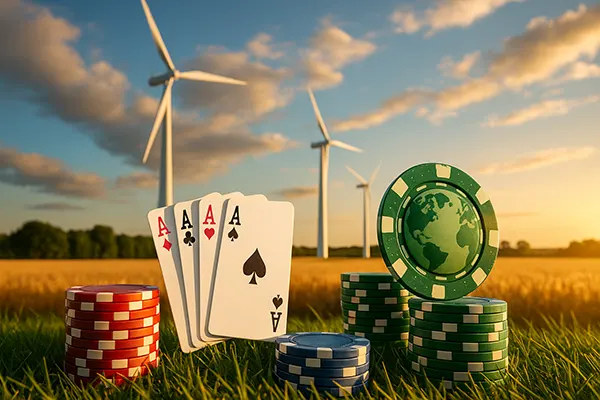
Ecological Footprint of Online Poker: How Green Is the Gaming Environment?
In recent years, the conversation around sustainability has extended into digital industries, including online poker. While many perceive poker as an activity with minimal environmental consequences due to its virtual nature, the reality is more complex. Behind every hand dealt online lies a network of servers, energy consumption, and digital infrastructure that contributes to the overall ecological footprint. Understanding the real impact of online poker is essential for both players and operators who aim to support a more sustainable future.
Energy Consumption of Online Poker Platforms
One of the key factors shaping the ecological footprint of online poker is the energy required to maintain its infrastructure. Operators run extensive server farms to process millions of games in real time. These data centres demand significant amounts of electricity, much of which is still generated from non-renewable sources in many regions. As a result, the carbon footprint of online gaming is not negligible.
Moreover, the global popularity of online poker increases the energy demand further. Players logging in from multiple time zones keep servers active around the clock. While the activity itself may seem harmless, the cumulative effect of these constant operations is considerable. The longer players stay connected, the more power is consumed.
There are also indirect forms of energy usage, such as the electricity consumed by personal devices. Whether through laptops, smartphones, or tablets, the demand for constant connection places additional strain on energy systems. When multiplied by millions of users worldwide, this impact becomes substantial.
Efforts Towards Sustainable Energy Solutions
To address these challenges, several operators have started exploring renewable energy sources for their data centres. Solar and wind energy are increasingly used to offset the carbon emissions of traditional electricity generation. This shift not only reduces the ecological footprint but also aligns with broader global climate goals.
Some providers partner with hosting companies committed to sustainability, ensuring their servers run on green energy. This approach demonstrates how the industry can adapt and take responsibility for its environmental impact. However, adoption remains uneven, and many companies still rely on conventional energy sources.
Players can also contribute by choosing poker rooms that publicly commit to environmental initiatives. Transparency about sustainability policies helps customers make informed decisions while pushing operators towards greener practices. In this way, consumer awareness becomes a driving force for change.
Electronic Waste and Hardware Dependency
Another important aspect of online poker’s ecological footprint is the hardware used by players. Devices such as smartphones, tablets, and computers are central to accessing poker games, yet their production and disposal generate significant amounts of electronic waste. Manufacturing these devices requires raw materials, including rare earth elements, which are often extracted through environmentally damaging processes.
Electronic waste is a growing global concern. Outdated devices are frequently discarded rather than recycled, adding pressure to landfills and releasing harmful substances into the environment. Since poker enthusiasts tend to upgrade their devices regularly for performance, this contributes to the cycle of waste.
Additionally, accessories like headphones, chargers, and batteries further add to the problem. The more people engage in online gaming, the greater the demand for supporting electronics. Without adequate recycling systems, the long-term impact of this dependency is difficult to mitigate.
Promoting Recycling and Device Longevity
Addressing electronic waste requires a multi-layered approach. Manufacturers must design devices that are easier to recycle, while governments and industry bodies should promote responsible disposal. Players, too, can play their part by extending the life of their devices through proper maintenance and repairs.
Some poker operators encourage sustainable behaviour by raising awareness about responsible electronics use. By highlighting the environmental consequences of device turnover, they motivate players to reconsider how often they upgrade their technology. This kind of education can shift attitudes towards sustainability.
Another strategy is incentivising recycling programmes. Offering players rewards or bonuses for returning old devices to certified recycling centres is an innovative approach that could combine gaming engagement with environmental responsibility. Such practices not only reduce waste but also strengthen the industry’s reputation for corporate responsibility.

The Future of Sustainable Online Poker
Looking ahead, the online poker industry has significant potential to reduce its ecological footprint. Emerging technologies, such as blockchain and cloud-based optimisation, can help make operations more energy-efficient. By adopting smarter solutions, operators can manage resources better and reduce unnecessary consumption.
Legislation will also play a crucial role. Governments are increasingly implementing stricter environmental standards for digital industries, pushing operators to integrate sustainability into their business models. Compliance with these regulations not only benefits the planet but also ensures long-term stability for the industry.
Finally, the role of players cannot be underestimated. By supporting eco-friendly operators and adopting sustainable behaviours, players contribute directly to shaping the industry’s future. Consumer demand for greener options has already transformed other sectors, and poker is unlikely to remain untouched by this global trend.
Building a Greener Gaming Culture
Creating a sustainable online poker ecosystem requires cooperation between operators, players, and regulators. Industry leaders must set the tone by prioritising eco-friendly initiatives, while regulators ensure compliance and enforce standards. Players, meanwhile, can strengthen the movement through conscious choices.
Public campaigns highlighting the ecological footprint of digital entertainment are also vital. Raising awareness about issues such as server energy use and electronic waste can inspire collective action. When stakeholders work together, the potential for real environmental improvements becomes achievable.
Ultimately, the transition to greener practices will define the future of online poker. By embedding sustainability into its core operations, the industry can evolve into a responsible and forward-looking space that balances entertainment with environmental stewardship.

